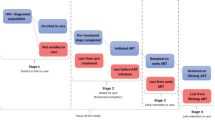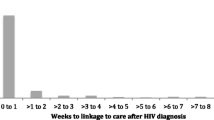Abstract
Between October 2015 and March 2018, we conducted the Modified Antiretroviral Treatment Access Study (MARTAS), a nurse-delivered case management intervention to improve linkage-to-care for persons recently tested HIV positive. Adult participants from nine urban clinics in three regions of Ukraine were randomized to either MARTAS or standard of care (SOC) using individual, parallel, two-arm design. The main study outcome was linkage-to-care (defined as registration at an HIV clinic) within a 3-month period from enrollment in the study. Intention-to-treat analysis of MARTAS (n = 135) versus SOC (n = 139) showed intervention efficacy in linkage to HIV care (84.4% vs. 33.8%; adjusted RR 2.45; 95% CI 1.72, 3.47; p < 0.001). MARTAS is recommended for implementation in Ukraine and may be helpful in other countries with similar gaps in linkage-to-care. Clinicaltrials.gov registration number: NCT02338024.




Similar content being viewed by others
References
UNAIDS Data Tables. 2011. https://www.unaids.org/sites/default/files/media_asset/JC2225_UNAIDS_datatables_en_1.pdf. Accessed 27 Dec 2019.
UNAIDS data. 2018. https://www.unaids.org/sites/default/files/media_asset/unaids-data-2018_en.pdf. Accessed 19 Sept 2018.
Ukrainian Center for Public Health. 2018 HIV infection in Ukraine. Informational Bulletin No. 49. https://phc.org.ua/uploads/documents/c21991/40fc8f955d5286e602e5ce1e8fac0fe2.pdf. Accessed 19 Sept 2018.
Maulsby C, Sacamano P, Jain KM, et al. Barriers and facilitators to the implementation of a national HIV linkage, re-engagement, and retention in care program. AIDS Educ Prev. 2017;29(5):443–56.
Craw JA, Gardner LI, Marks G, et al. Brief strengths-based case management promotes entry into HIV medical care: results of the antiretroviral treatment access study-II. J Acquir Immune Defic Syndr. 2008;47(5):597–606.
Wohl AR, Dierst-Davies R, Victoroff A, et al. Implementation and operational research: the navigation program: an intervention to reengage lost patients at 7 HIV clinics in Los Angeles County, 2012–2014. J Acquir Immune Defic Syndr. 2016;71(2):e44–50.
Giordano TP. Strategies for linkage to and engagement with care: focus on intervention. Top Antivir Med. 2018;26(2):62–5.
Govindasamy D, Ford N, Kranzer K. Risk factors, barriers and facilitators for linkage to antiretroviral therapy care: a systematic review. AIDS. 2012;26(16):2059–67.
Kiriazova TK, Postnov OV, Perehinets IB, Neduzhko OO. Association of injecting drug use and late enrolment in HIV medical care in Odessa Region. Ukraine HIV Med. 2013;14(Suppl 3):38–41.
Neduzhko O, Postnov O, Perehinets I, et al. Factors associated with delayed enrollment in HIV medical care among HIV-positive individuals in Odessa Region, Ukraine. J Int Assoc Provid AIDS Care. 2017;16(2):168–73.
Croxford S, Burns F, Copas A, et al. Factors associated with delayed linkage to care following HIV diagnosis in the WHO European Region. HIV Med. 2018;19(Suppl 1):40–6.
Ministry of Health of Ukraine. (2010) About approving the clinical protocol of antiretroviral therapy of HIV infection in adults and adolescents. https://zakon.rada.gov.ua/rada/show/v0551282-10. Accessed 27 Sept 2018.
Cohen MS, Chen YQ, McCauley M, et al. Antiretroviral therapy for the prevention of HIV-1 transmission. N Engl J Med. 2016;375(9):830–9.
Ulett KB, Willig JH, Lin HY, et al. The therapeutic implications of timely linkage and early retention in HIV care. AIDS Patient Care STDS. 2009;23(1):41–9.
Brennan A, Browne JP, Horgan M. A systematic review of health service interventions to improve linkage with or retention in HIV care. AIDS Care. 2014;26(7):804–12.
Eaton EF, Saag MS, Mugavero M. Engagement in human immunodeficiency virus care: linkage, retention, and antiretroviral therapy adherence. Infect Dis Clin North Am. 2014;28(3):355–69.
Govindasamy D, Meghij J, Kebede Negussi E, et al. Interventions to improve or facilitate linkage to or retention in pre-ART (HIV) care and initiation of ART in low- and middle-income settings–a systematic review. J Int AIDS Soc. 2014;17:19032.
Thompson MA, Mugavero MJ, Amico KR, et al. Guidelines for improving entry into and retention in care and antiretroviral adherence for persons with HIV: evidence-based recommendations from an International Association of Physicians in AIDS Care panel. Ann Intern Med. 2012;156(11):817–33.
Bradford JB, Coleman S, Cunningham W. HIV system navigation: an emerging model to improve HIV care access. AIDS Patient Care STDS. 2007;21(Suppl 1):S49–58.
Higa DH, Marks G, Crepaz N, et al. Interventions to improve retention in HIV primary care: a systematic review of U.S. studies. Curr HIV/AIDS Rep. 2012;9(4):313–25.
Gardner LI, Metsch LR, Anderson-Mahoney P, et al. Efficacy of a brief case management intervention to link recently diagnosed HIV-infected persons to care. AIDS. 2005;19(4):423–31.
Saleebey D. The strengths perspective in social work practice. 2nd ed. New York: Longman; 1997. p. 259.
Rapp CA, Chamberlain R. Case management services for the chronically mentally ill. Soc Work. 1985;30(5):417–22.
Zimmerman MA. Psychological empowerment: issues and illustrations. Am J Community Psychol. 1995;23(5):581–99.
Bandura A. Social foundations of thought and action : a social cognitive theory. Englewood Cliffs: Prentice-Hall; 1986. p. 617.
Kiriazova T, Postnov O, Bingham T, et al. Patient and provider perspectives inform an intervention to improve linkage to care for HIV patients in Ukraine. BMC Health Serv Res. 2018;18(1):58.
Neduzhko O, Postnov O, Bingham T, et al. Feasibility and acceptability of the Modified Antiretroviral Treatment Access Study (MARTAS) Intervention Based on a Pilot Study in Ukraine. J Int Assoc Provid AIDS Care. 2019;18:2325958218823257.
Forsyth A, Yakovchenko V. Secretary Sebelius approves indicators for monitoring HHS-funded HIV services. 2012. https://www.hiv.gov/blog/secretary-sebelius-approves-indicators-for-monitoring-hhs-funded-hiv-services. Accessed 15 Jan 2019.
Eaton WW, Smith C, Ybarra M, et al. The use of psychological testing for treatment planning and outcomes assessment: Instruments for adults. In: Maruish ME, editor. Center for Epidemiologic Studies Depression Scale: review and revision (CESD and CESD-R). Mahwah: Lawrence Erlbaum Associates Publishers; 2004. p. 363–377.
Radloff LS. The CES-D Scale: a self-report depression scale for research in the general population. Appl Psychol Meas. 1977;1(3):385–401.
Weissman MM, Sholomskas D, Pottenger M, et al. Assessing depressive symptoms in five psychiatric populations: a validation study. Am J Epidemiol. 1977;106(3):203–14.
Babor T, Higgins-Biddle J, Saunders J, Monteiro M. AUDIT: the alcohol use disorders identification test: guidelines for use in primary health care. 2nd ed. Geneva: World Health Organization; 2001.
Justice AC, Holmes W, Gifford AL, et al. Development and validation of a self-completed HIV symptom index. J Clin Epidemiol. 2001;54(Suppl 1):S77–90.
Kilbourne AM, Justice AC, Rollman BL, et al. Clinical importance of HIV and depressive symptoms among veterans with HIV infection. J Gen Intern Med. 2002;17(7):512–20.
DHS Model Questionnaire—Phase 7 (English, French). 2015. https://dhsprogram.com/publications/publication-dhsq7-dhs-questionnaires-and-manuals.cfm. Accessed 14 Dec 2018.
World Health Organization. WHO case definitions of HIV for surveillance and revised clinical staging and immunological classification of HIV-related disease in adults and children. 2007. https://www.who.int/hiv/pub/guidelines/HIVstaging150307.pdf?ua=1. Accessed 19 Sept 2018.
Gardner LI, Marks G, Craw J, et al. Demographic, psychological, and behavioral modifiers of the Antiretroviral Treatment Access Study (ARTAS) intervention. AIDS Patient Care STDS. 2009;23(9):735–42.
Udeagu CC, Webster TR, Bocour A, et al. Lost or just not following up: public health effort to re-engage HIV-infected persons lost to follow-up into HIV medical care. AIDS. 2013;27(14):2271–9.
Bove JM, Golden MR, Dhanireddy S, et al. Outcomes of a clinic-based surveillance-informed intervention to relink patients to HIV care. J Acquir Immune Defic Syndr. 2015;70(3):262–8.
Turner CF, Ku L, Rogers SM, et al. Adolescent sexual behavior, drug use, and violence: increased reporting with computer survey technology. Science. 1998;280(5365):867–73.
Des Jarlais DC, Paone D, Milliken J, et al. Audio-computer interviewing to measure risk behaviour for HIV among injecting drug users: a quasi-randomised trial. Lancet. 1999;353(9165):1657–61.
Acknowledgements
We would like to thank Dr. Sherri L. Pals (CDC, Division of Global HIV and Tuberculosis) for advice and comments on statistical aspects. The findings and conclusions in this report are those of the authors and do not necessarily represent the official position of the funding agencies.
Funding
This project has been supported by the President’s Emergency Plan for AIDS Relief (PEPFAR) through the U.S. CDC under the terms of Grant 3U01GH000752-02S1.
Author information
Authors and Affiliations
Corresponding author
Ethics declarations
Conflict of interest
The authors declare that they have no conflicts of interest.
Ethical Approval
All procedures performed in studies involving human participants were in accordance with the ethical standards of the institutional and/or national research committee and with the 1964 Helsinki declaration and its later amendments or comparable ethical standards. The study protocol and instruments were approved by the institutional human subjects review board at the UIPHP under FWA00015634. The protocol was also reviewed in accordance with the U.S. Centers for Disease Control and Prevention (CDC) human research protection procedures and determined to be research, but CDC investigators did not interact with human subjects or have access to identifiable data or specimens for research purposes. The study was registered in clinicaltrials.gov NCT02338024.
Informed Consent
Written informed consent was obtained from all individual participants included in the study.
Research Involving Human Participants and/or Animals
This article does not contain any studies with animals performed by any of the authors.
Additional information
Publisher's Note
Springer Nature remains neutral with regard to jurisdictional claims in published maps and institutional affiliations.
Rights and permissions
About this article
Cite this article
Neduzhko, O., Postnov, O., Sereda, Y. et al. Modified Antiretroviral Treatment Access Study (MARTAS): A Randomized Controlled Trial of the Efficacy of a Linkage‐to‐Care Intervention Among HIV-Positive Patients in Ukraine. AIDS Behav 24, 3142–3154 (2020). https://doi.org/10.1007/s10461-020-02873-7
Published:
Issue Date:
DOI: https://doi.org/10.1007/s10461-020-02873-7




